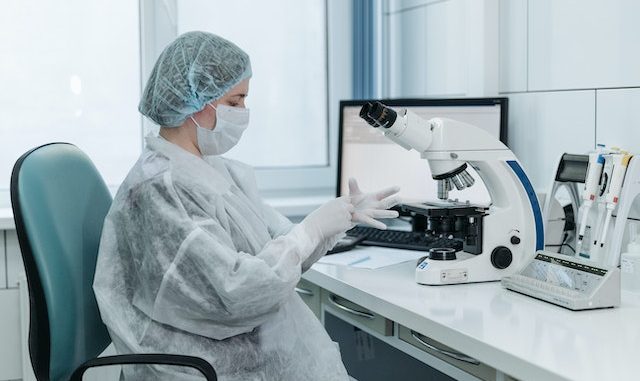
In the healthcare and pharmaceutical realms, technology’s impact on drug discovery has been truly groundbreaking. Over recent decades, advancements across various technological fronts, encompassing artificial intelligence, genomics, robotics, and data analytics, have catalyzed a profound transformation in the entire drug discovery landscape.
Statistics underscore this transformation: Over 70% of respondents from the pharmaceutical industry anticipate that drug development will be the area most profoundly impacted by the implementation of smart technologies. This article explores the profound influence of technology on drug discovery today, discussing the benefits, challenges, and future prospects.
Source: Unsplash
Accelerating Drug Discovery
One of the most remarkable ways technology has revolutionized drug discovery is by supercharging the research and development process. Picture this: high-throughput screening technologies have armed researchers with the ability to swiftly sort through thousands of compounds, like prospectors seeking therapeutic treasures.
Furthermore, thanks to automated robotic systems, those once-burdensome, repetitive tasks that ate up so much time can now be entrusted to machines, freeing up scientists to dive into the intricate and imaginative realms of drug development. This newfound efficiency has not only shaved off significant time but also substantially cut down on the expenses associated with taking a drug from the laboratory bench to Syner-G BioPharma. In the grand scheme of things, it means life-saving medications are now more readily available to those who depend on them.
Lower Chances of Human Error
Technology has significantly reduced the risk of human error in drug discovery. Luckily, there are tools that ensure the precise and consistent execution of critical tasks. These tools handle repetitive processes with minimal variability, minimizing the potential for mistakes caused by manual intervention.
For instance, if you use ELISA assays to support your research in drug discovery, an ELISA plate washer can automate the washing and dispensing steps in a typical screening workflow, helping you enhance data quality and improve reproducibility while also saving you time and money.
With advanced systems adhering to standardized protocols, researchers can rely on more reliable and reproducible results, ultimately advancing drug development with greater accuracy and efficiency.
Drug Repurposing
Technology has given a new lease of life to the idea of drug repurposing, making it feel more alive than ever. Imagine scientists digging deep into existing drug databases and molecular profiles, like detectives on the hunt for hidden treasures. They’re on the lookout for established medicines that could work wonders in treating different diseases. This not only saves precious time and resources but also holds the promise of getting innovative treatments into the hands of patients faster, offering hope and healing when it’s needed most.
Artificial Intelligence and Machine Learning
Artificial intelligence and machine learning have become indispensable tools in drug discovery. These technologies can analyze massive datasets, predict drug-target interactions, design molecules with desired properties, and even assist in clinical trial design. AI-driven drug discovery platforms are increasingly being used to identify drug candidates with higher success rates, ultimately reducing the attrition rate in drug development.
Personalized Medicine
The march of progress in genomics and technology has laid the foundation for personalized medicine. It’s like crafting a bespoke suit for your health. Here’s how it works: By delving into an individual’s genetic blueprint and examining other biological markers, scientists and doctors can fine-tune treatments to match that person’s distinct characteristics.
This isn’t just about making treatment work better; it’s also about lowering the chances of unwanted side effects. In the end, it results in medications that are not only more effective but also safer, ensuring patients receive the care they truly need.
Virtual Screening and Molecular Modeling
Computational methods like virtual screening and molecular modeling have become indispensable tools in drug discovery. These techniques allow researchers to predict the binding affinity of a molecule to a target protein, providing valuable insights into a drug’s potential efficacy. Molecular dynamics simulations can also help to understand the behavior of drug candidates within the body, aiding in the optimization of drug properties.
Source: Unsplash
Challenges in Technological Drug Discovery
While technology has brought significant advancements to drug discovery, it is not without its challenges. Here are some of the notable hurdles:
- Data quality and privacy: The reliance on large datasets raises concerns about data quality and privacy. Ensuring the integrity and security of patient data and experimental results is crucial.
- Complexity of analysis: Handling and interpreting massive datasets can be daunting. Skilled data scientists and computational biologists are required to make sense of the information generated.
- High costs: Cutting-edge technology can be expensive to acquire and maintain, creating barriers for smaller research institutions and companies.
- Regulatory challenges: Regulatory agencies must adapt to the rapidly evolving technological landscape to ensure that new drug discovery approaches meet safety and efficacy standards.
Future Prospects
The future of drug discovery holds even more promise with emerging technologies and trends:
- Quantum computing: Quantum computing has the potential to significantly accelerate drug discovery by solving complex computational problems much faster than classical computers.
- 3D printing: 3D printing is advancing drug manufacturing, enabling the production of personalized medicines and complex drug delivery systems.
- Blockchain for data security: Blockchain technology may enhance data security and transparency in drug development, addressing concerns about data integrity.
Conclusion
Technology heralds a new era in drug discovery, revolutionizing every stage from target identification to clinical trials. This symphony of artificial intelligence, data analysis, and advanced lab techniques drives remarkable progress in creating safer and more effective medicines, propelling healthcare into a new age of advancement.
Nevertheless, the field grapples with enduring challenges linked to safeguarding data privacy, managing costs, and navigating evolving regulations. As technology advances persistently, the future of drug discovery brims with potential, promising enhanced treatments and ultimately better outcomes for patients.
